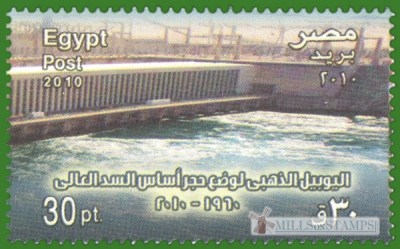-
Golden Jubilee of The High Dam
Egypt 2010
In issue: Stamp(s): 2
Issued in: pairs with common design
-
Perforation type: 13x13 ½
Subject:
30 piastres. Front view of the High Dam* (detail)
Topics: Hydroelectricity
-
Perforation type: 13x13 ½
Subject:
1 Egyptian Pound. Front view of the High Dam* (detail)
Additional:
*The Aswan Dam is an embankment dam situated across the Nile River in Aswan, Egypt. Since the 1950s, the name commonly refers to the High Dam, which is larger and newer than the Aswan Low Dam, which was first completed in 1902. Construction of the High Dam became a key objective of the Egyptian Government following the Egyptian Revolution of 1952, as the ability to control the flood waters, and harness the hydroelectric power that it could produce, were seen as pivotal to Egypt's industrialisation. The High Dam was constructed between 1960 and 1970. It aimed to increase economic production by further regulating the annual river flooding and providing storage of water for agriculture, and later, to generate hydroelectricity. The dam has had a significant impact on the economy and culture of Egypt.
Before the dams were built, the Nile River flooded each year during late summer, as water flowed down the valley from its East African drainage basin. These floods brought high water and natural nutrients and minerals that annually enriched the fertile soil along the floodplain and delta; this made the Nile valley ideal for farming since ancient times. Because floods vary, in high-water years, the whole crop might be wiped out, while in low-water years widespread drought and famine occasionally occurred. As Egypt's population grew and conditions changed, both a desire and ability developed to control the floods, and thus both protect and support farmland and the economically important cotton crop. With the reservoir storage provided by these dams, the floods could be lessened, and the water could be stored for later release.
__________
This information has been taken from Wikipedia
Topics: Hydroelectricity




